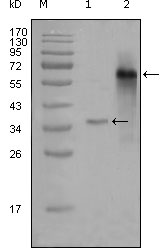SRC-3 (Phospho Thr24) rabbit pAb
- Catalog No.:YP1510
- Applications:WB
- Reactivity:Human;Rat;Mouse;
- Target:
- NCoA-3
- Fields:
- >>Endocrine resistance;>>Estrogen signaling pathway;>>Thyroid hormone signaling pathway;>>Pathways in cancer;>>Breast cancer
- Gene Name:
- NCOA3 AIB1 BHLHE42 RAC3 TRAM1
- Protein Name:
- SRC-3 (Thr24)
- Human Gene Id:
- 8202
- Human Swiss Prot No:
- Q9Y6Q9
- Mouse Swiss Prot No:
- O09000
- Rat Swiss Prot No:
- Q9EPU2
- Immunogen:
- Synthesized phosho peptide around human SRC-3 (Thr24)
- Specificity:
- This antibody detects endogenous levels of Human SRC-3 (phospho-Thr24)
- Formulation:
- Liquid in PBS containing 50% glycerol, 0.5% BSA and 0.02% sodium azide.
- Source:
- Polyclonal, Rabbit,IgG
- Dilution:
- WB 1:1000-2000
- Purification:
- The antibody was affinity-purified from rabbit serum by affinity-chromatography using specific immunogen.
- Concentration:
- 1 mg/ml
- Storage Stability:
- -15°C to -25°C/1 year(Do not lower than -25°C)
- Other Name:
- Nuclear receptor coactivator 3 (NCoA-3) (EC 2.3.1.48) (ACTR) (Amplified in breast cancer 1 protein) (AIB-1) (CBP-interacting protein) (pCIP) (Class E basic helix-loop-helix protein 42) (bHLHe42) (Receptor-associated coactivator 3) (RAC-3) (Steroid receptor coactivator protein 3) (SRC-3) (Thyroid hormone receptor activator molecule 1) (TRAM-1)
- Observed Band(KD):
- 160kD
- Background:
- The protein encoded by this gene is a nuclear receptor coactivator that interacts with nuclear hormone receptors to enhance their transcriptional activator functions. The encoded protein has histone acetyltransferase activity and recruits p300/CBP-associated factor and CREB binding protein as part of a multisubunit coactivation complex. This protein is initially found in the cytoplasm but is translocated into the nucleus upon phosphorylation. Several transcript variants encoding different isoforms have been found for this gene. In addition, a polymorphic repeat region is found in the C-terminus of the encoded protein. [provided by RefSeq, Mar 2010],
- Function:
- alternative products:Additional isoforms seem to exist,catalytic activity:Acetyl-CoA + histone = CoA + acetylhistone.,domain:Contains three Leu-Xaa-Xaa-Leu-Leu (LXXLL) motifs. Motifs 1 and 2 are essential for the association with nuclear receptors, and constitute the RID domain (Receptor-interacting domain).,enzyme regulation:Coactivator activity on nuclear receptors and NF-kappa-B pathways is enhanced by various hormones, and the TNF cytokine, respectively. TNF stimulation probably enhances phosphorylation, which in turn activates coactivator function. In contrast, acetylation by CREBBP apparently suppresses coactivation of target genes by disrupting its association with nuclear receptors.,function:Nuclear receptor coactivator that directly binds nuclear receptors and stimulates the transcriptional activities in a hormone-dependent fashion. Plays a central role in creating a multisubuni
- Subcellular Location:
- Cytoplasm. Nucleus. Mainly cytoplasmic and weakly nuclear. Upon TNF activation and subsequent phosphorylation, it translocates from the cytoplasm to the nucleus.
- Expression:
- Widely expressed. High expression in heart, skeletal muscle, pancreas and placenta. Low expression in brain, and very low in lung, liver and kidney.
- June 19-2018
- WESTERN IMMUNOBLOTTING PROTOCOL
- June 19-2018
- IMMUNOHISTOCHEMISTRY-PARAFFIN PROTOCOL
- June 19-2018
- IMMUNOFLUORESCENCE PROTOCOL
- September 08-2020
- FLOW-CYTOMEYRT-PROTOCOL
- May 20-2022
- Cell-Based ELISA│解您多样本WB检测之困扰
- July 13-2018
- CELL-BASED-ELISA-PROTOCOL-FOR-ACETYL-PROTEIN
- July 13-2018
- CELL-BASED-ELISA-PROTOCOL-FOR-PHOSPHO-PROTEIN
- July 13-2018
- Antibody-FAQs



